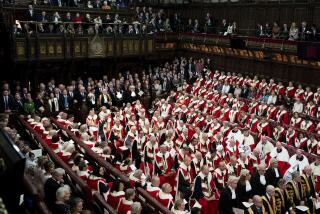Peers of the Realm May Be in for Housecleaning
- Share via
LONDON — “The cure for admiring the House of Lords is to go and look at it,” the 19th century economist Walter Bagehot wrote of the upper chamber of the British Parliament, long known for the eccentricity of its titled amateur politicians.
Prime Minister Tony Blair has a more radical cure in mind.
As the first part of a two-stage reform, the Labor Party leader wants to take away the speaking and voting rights of the 631 hereditary peers of the realm who, purely by virtue of their aristocratic ancestry, still have the automatic right to sit in the 1,134-seat house--and replace them with more efficient legislators.
It would be the biggest reform of the chamber since 1958, when a Conservative Party government invented “life peerages,” a system whereby prominent politicians, industrialists or public servants are bestowed titles that their children cannot inherit.
But Blair hasn’t come up with a clear plan for the second stage of reform--the makeup of the new upper house once the hereditary peers have been sent back to what writer Virginia Woolf called “the comfortably padded lunatic asylums known, euphemistically, as the stately homes of England.”
The idea of modernizing the House of Lords is supported by almost two-thirds of voters, who no longer have much sympathy for old-fashioned notions of deference and exaggerated respect for the titled minority historically deemed their “betters.”
“The inadequacy of the House of Lords as a vital constitutional safeguard was brought home to me one evening as I sat in my office following one particularly close vote in the House of Lords,” Ken Livingstone, a politician on the leftist fringe of the newly centrist Labor Party, commented caustically. “The phone went, and one of our chauffeurs said there was a problem: ‘I’ve got Lord X in the back of my car, and he can’t remember where he lives.’ ”
The endearing dottiness of many of the hereditary peers is indeed legendary. The speeches of one peer, the 4th Lord Russell, included one on crocheting his trousers out of string and another, in 1978, urging that “naked bathing on beaches or in rivers ought to be universal” and ending with the warning that “Mr. Brezhnev and Mr. Carter are really the same person.”
But Conservative politicians and others have strongly criticized the government’s desire to press ahead with the first stage this year without any idea of how to replace the chamber’s current members. The think tank Demos charged that the government is avoiding the radical reform that is needed.
“Labor is uncertain what it wants Britain to be like,” Demos said in a report. “It is therefore attracted to modernizing the country’s appearance and leaving it at that.”
The ritual absurdities of the Lords--the medaled flunkies, the odd costumes and the elaborate debating courtesies of “my noble kinsman” and “the right reverend prelate”--are gently mocked by many Britons.
“It really is God’s waiting room, a marvelous place for old gentlemen to live out their last years chatting and reminiscing,” playwright and life peer Lord Willis told the Times of London newspaper in 1992. “I love the old place, but I mustn’t let that kind of luxury blind me to its constitutional defects.”
Because the chamber can only delay--not kill off--government legislation by voting against it, and because many of the more frivolous hereditary peers seldom bother to put in an appearance in London, government employees are said to treat the upper chamber with scant respect.
“This is a rotten argument, but it should be good enough for their lordships on a hot summer afternoon,” went an annotation to a ministerial brief that is often said to have been read out by mistake in the Lords.
Inventing life peerages didn’t raise public belief in the modern chamber’s competence. Instead, it has become a sly joke that difficult or incompetent politicians who are made lords are being “kicked upstairs”--to keep them out of the business of serious politics in the House of Commons.
Now, time is running out fast for the hereditary peers. In June, the leader of the Lords, Lord Richard, confirmed that the government would bring in legislation on abolishing their rights in the fall session of Parliament. But the government once again failed to set out its vision for the final shape of the House, or a timetable for the changes--which will have to be approved by both houses to take effect.
Richard said only that, after the abolition of hereditary seats, the Lords would operate as an interim chamber while the government reviewed the way life peers are appointed to make them more representative of the country. The removal of the hereditary peers, a key commitment at Labor’s election just over a year ago, would leave a chamber of just under 500 life peers plus 26 Law Lords and Church of England bishops.
The House of Lords is by nature Conservative in its sympathies, and the vagueness of this reform plan has outraged the Tories. While Conservative politicians insist that they are not opposed to getting rid of the voting rights of hereditary peers, they say they want to see the full plan for the creation of a new upper house before any changes start.
“The government don’t know what they actually want to do to the House of Lords, so now they are falling back on their contingency plan, which is to say, let’s just get rid of the hereditary peers,” said Conservative Party leader William Hague. “Let them come forward with some real proposals for an imaginatively designed second chamber if they want a real debate about this.”
Conservative fears that the Labor government is trying to create a rubber-stamp upper chamber--and stuff it with new Labor life peers sympathetic to government legislation--were fanned in mid-June, when this year’s list of 27 new life peers was published. Blair had nominated 18 of the new life peers, mostly high-profile Labor backers. The Conservative Party immediately condemned those on Blair’s list as “Tony’s Cronies.”
The question of what the future House of Lords should look like has become a subject for national debate. While many pundits worry about the shortage of constitutional checks and balances to curtail the power of a strong central government, opinions on how to improve the situation differ wildly.
“The rational solution is to have a wholly elected House exercising senatorial powers, as the upper chamber does in most advanced democracies. My own scheme is for senators to be elected for life or until such time as they choose voluntarily to retire,” said political analyst Ian Watkins.
“[But] an elected second chamber of any kind is highly unlikely. It would inevitably--and rightly--challenge the power of a House of Commons which is now almost as corrupt as any assembly of the 18th century in its dependence on government,” he added.
The Demos think tank suggested picking ordinary citizens by lot to serve in the upper chamber for a spell, following the example of ancient Athens or the modern example of jury service.
Meanwhile, the Conservative press has been publishing anguished letters from the traditionally minded one-third of the public who wants to keep the Lords in its present shape.
“I hope that Labor’s proposals take into account the position of the hereditary Earl Marshal,” one anxious reader wrote to the right-wing Daily Telegraph. “It should be unthinkable that after hundreds of years the Fitzalan-Howard family, with the Duke of Norfolk at its head, should unceremoniously not be permitted a seat.”
But arguments like this cut no ice with supporters of Blair’s reform. “It may indeed be an unpalatable prospect for the Fitzalan-Howards,” commentator Anne McElvoy noted gleefully. “On the great scale of unpalatables, however, the end of their hereditary right to act as chief corset-tightener at the Opening of Parliament comes pretty low down on my list.”
The hereditary lords themselves have, by and large, read the writing on the wall.
Some are bewildered, like the 87-year-old 3rd Viscount Daventry, who was still asking, as recently as last year: “Why would you want to change something that has been working perfectly well for hundreds of years?”
But most are reluctantly resigning themselves to their fate.
Parliamentary correspondents, who mostly just report the serious debates in the House of Commons, whisper fondly that they have noticed more peers than usual turning up at Westminster lately.
“It won’t be the end of the world, but it will be a pity,” the 45-year-old Duke of Somerset said of the abolition plan. “It upsets me to think that there will be a deterioration in the process of passing laws. And I do dislike this apparent desire to do away with anything that smacks of tradition. The trouble is that most people don’t understand what we do.”
More to Read
Sign up for Essential California
The most important California stories and recommendations in your inbox every morning.
You may occasionally receive promotional content from the Los Angeles Times.













